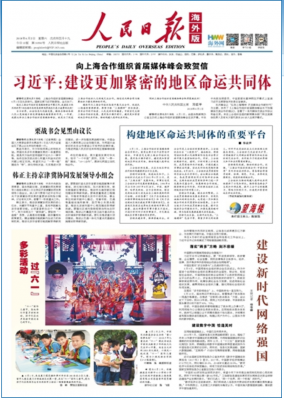Last Friday, the Shanghai Cooperation Organization (SCO), an international political, economic and security organization with members and observer states spanning Eurasia and South Asia, held its first Media Summit in Beijing. During the meeting, attended by representatives from more than 110 media organizations, the group released a “cooperation initiative” calling on all SCO members to use the opportunity of the upcoming summit in Qingdao to “drive media dialogue and cooperation to a new level.”

In a letter of welcome published on the front page of the overseas edition of the People’s Daily on Saturday, President Xi Jinping said the meeting was a positive opportunity to promote the “Shanghai spirit,” and to work toward “a community of common future [or destiny] for humankind,” the latter phrase now an important centerpiece of Chinese foreign policy. The “Shanghai Spirit,” a phrase often used in conjunction with the SCO, refers, according to the official Xinhua News Agency, to the spirit of “mutual trust, mutual benefit, equality, consultation, respect for cultural diversity, and pursuit of common development.”
In typical fashion, both English and Chinese language reporting of the SCO Media Summit in state media mostly failed to provide a concrete picture of the purpose of the meeting and the expected outcomes. Xinhua quoted Ainura Temirbekova, Kyrgyzstan’s deputy minister for culture and information, as saying the “Shanghai Spirit” was “not just confined to important statements, but proved by deeds.” Dmitrii Lukiantsev, Russia’s representative to the SCO, was quoted (or, rather, paraphrased) as saying that “the organization sets a good example for building a new type of international relations and the ‘Shanghai Spirit’ is of great relevance today.”
What deeds? What examples? What relevance? None of the foreign representatives name-dropped in Chinese state media coverage seemed capable of spelling it out — although, again, Xinhua said that Temirbekova said that “China has made concrete contributions, and the cooperation between SCO countries on the global stage is the only pathway to a shared future.”
So why is China bringing together more than 100 media organizations from across Asia? What are its strategic objectives here?
If we wade knee-deep through the swamp of Chinese state media platitudes, we can find just a bit of clarity. It comes in this passage of a report by the Economic Daily quoting Fang Jiangshan (方江山), the deputy editor-in-chief of the Chinese Communist Party’s flagship People’s Daily. In the same report as it was run at People’s Daily Online, the passage was bolded for emphasis:
Declaration on International Public Opinion Environment
The strengthening and promotion of media cooperation within the Shanghai Cooperation Organization is a shared aspiration of all parties. People’s Daily deputy editor-in-chief Fang Jiangshan points out that the media constitute an important resource and means of national governance and global governance, and whoever controls discourse power has a grasp of great soft power, and therefore can better stand in a position of righteousness and justice (道义制高点). In the present international public opinion framework, the members of the SCO currently lack media organizations with global influence, and the media of many member states still seriously rely on Western news agencies for their international news reports. “The political security, economic development and social stability of SCO member states is upset by a massive gap in terms of digital technologies,” said Fang Jiangshan . . . . Fang believes that to change this situation, the SCO and its members states must place a strong emphasis on media development and media cooperation, further building mechanisms for media cooperation.
According to the Economic Daily report, the consensus coming out of the SCO Media Summit was that greater media cooperation among member states could help to “build a public opinion environment more beneficial to regional peace, development and stability.”
Make no mistake: the proper translation here is that China wants to work with its Asian partners in the SCO to break what it sees as Western dominance of the global narrative on governance. Imagine a world in which media and their audiences across Asia see global affairs not through the lens of the Associated Press, AFP, Reuters or the New York Times, but through the grand political vision offered by Xinhua.
It’s not difficult to ascertain which nation state, under such a “public opinion environment,” would come off as the beneficent protagonist.




















